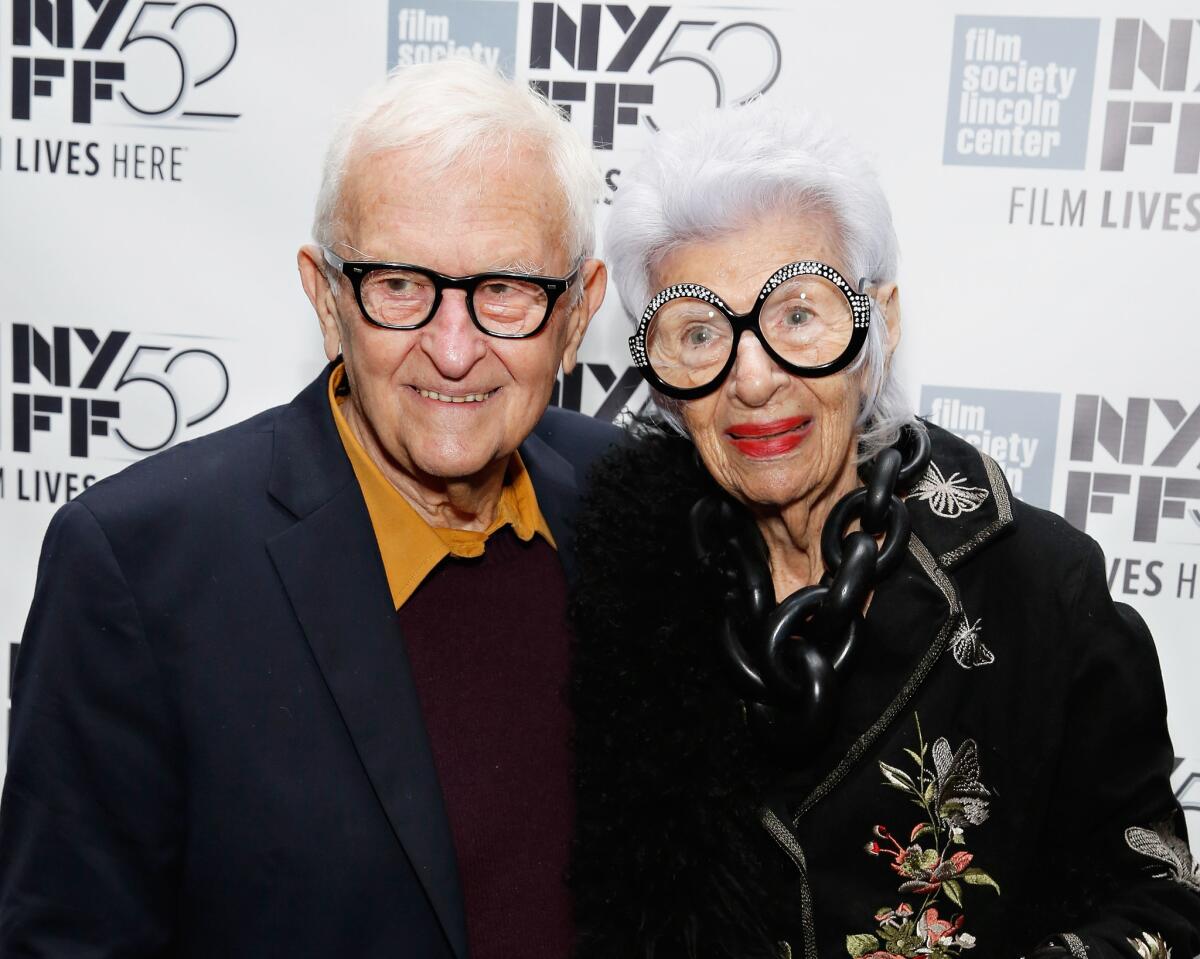With a new film, Albert Maysles maintains his empathy, and longevity

Reporting from New York — As the director who gave us personalities like Big Edie in “Grey Gardens” and several of the Rolling Stones in “Gimme Shelter,” Albert Maysles has captured a few colorful subjects in his day.
That day, it seems, shows few signs of winding down.
At a stage of life when many directors would have moved into the retirement, victory-lap phase — he is 87, and made his first film 49 years ago — Maysles continues to dream up new directing projects and execute existing ones.
Last week at the New York Film Festival, Maysles premiered his latest movie, “Iris,” about the fashion iconoclast Iris Apfel. Maysles is the kind of person whose work ethic makes your most productive day feel like a nap the beach. “Iris” is, depending on how one counts, his 38th directorial effort and close to the 75th film he’s worked on in one or more other capacities, particularly as cinematographer.
On a recent Friday, Maysles sat behind his desk in lower Harlem, looking semiformal in a jacket. He was set to attend a New York Film Festival event that evening but there was work to be done that day. A computer monitor blinked away on his desk; a copy of the new issue of the Hollywood Reporter sat in front of him. The space is a combination office, theater and education space that he runs with his daughter and producer Rebekah, and about a half-dozen employees in their 20s and early 30s hovered at desks nearby, discussing various Maysles-affiliate projects. He playfully told them to keep it down, and they scattered into other rooms. “Now, what should we talk about?” he asked, turning to a reporter.
“Iris” isn’t a bad place to start. The documentary is of a piece with many of Maysles’ films, which are interested in the marginal and offbeat, but are never judgmental and often sympathetic. It also is his first directorial effort in five years.
Far from a career valedictory, though, the movie shows a filmmaker at top, often dryly funny form.
An interior designer and collector with an eye for bold styles, Apfel has become a kind of sideways hero of the fashion world, its endearingly eccentric grandmother and moral compass. When things get black —figuratively and literally, given her disdain for the dark and monochromatic — she encourages a lightening up (usually with colorful costume jewelry or an odd knick-knack).
Maysles said he made the movie, perhaps subconsciously, about his mother, a kindly nurturing sort he felt may have worked its way into his thought process during shooting. “I wasn’t thinking about it then, but that could have been what it was about,” he said. But then, in his characteristically understated way, he added, “What I really liked and wanted to show was the glasses.” (Apfel’s large dark specs are among her most distinguishing accessories.)
At 93, Apfel, not unlike her chronicler, shows no signs of letting up, doing things her way even when the rest of the world has yet to catch up. “I happen not to like pretty,” she says to toward the end of the film with her characteristically endearing brusqueness, describing it as not interesting. “Most of the world isn’t with me but I don’t care.”
A similar vibe permeates the work of Maysles, who has refused to give in to fashion so he can maintain a truth all his own, a trailblazer who continues to make movies long after those he blazed a trail for have come to the end of the road.
Beginning in the 1960s, and 1970s, thanks in large part to the advent of smaller cameras, Maysles helped lead a group that pioneered the documentary form known as direct cinema. In “Shelter,” “Gardens” and the earlier “Salesman,” about a group of Irish American Bible salesmen, he offered an unheard-of level of closeness. “Salesman,” in 1969, was a novel enterprise in its own right. (Maysles said he made it in part to come to terms with his fractious boyhood relationships as a Jew with Irish Americans in the working-class Boston neighborhoods where he grew up.)
But it was “Gardens” in particular that changed the game. Coming out 38 years ago, it showed its complicated main characters with vivid, at times uncomfortable intimacy, opening up new avenues of possibility for those who thought no subject that strange could ever be witnessed that close.
Maysles’ influence on contemporary filmmakers is incalculable. That’s true in the spiritual sense, but also the literal one. The acclaimed filmmaker Barbara Kopple was an assistant on “Gimme Shelter” and cites Maysles as a mentor. When it came time for the Oscar nominee Eugene Jarecki to credit Maysles’ contributions to “Capturing the Friedmans,” Jarecki went with a simple “particularly good advice.”
Maysles says he has few regrets about the films he made, though he does seem to harbor memories of some negative reviews, citing a New York Times pan of “Grey Gardens” and describing how Big Edie, on her deathbed, pronounced the truth of the film.
Like “Gimme Shelter,” the film stirred controversy for what some felt was exploitation, though anyone weaned on modern cable non-scripted shows and its activist, troublemaking cameras would find such a characterization amusing. Maysles doesn’t offer a condemnation of the current reality television vogue of fomenting dysfunction except to give a small laugh and say, “sort-of reality,” when the term reality TV is used.
Instead he focuses on what he says is “the kindness” that documentarians should feel. It’s an abiding principal in much of his work—a close acquaintance with subjects that most filmmaking, even documentaries, he says don’t practice enough.
“To me it’s about that. People always say ‘Love Thy Neighbor’ but we never say ‘Meet Thy Neighbor. How many wars would we have fought if we could have met a single member of the family we were fighting against?” he said. “If you have the ability to connect through empathy, how you see the world changes.”
That sense of empathy can be found in his next movie, a Linklater-ish effort in which he filmed strangers who end up next to each other on interstate trains around the country. Many hours of footage have been shot — the project has been mentioned, under different names, as far back as the 1980s — and recently the difficult work of hammering it into a film began. (Maysles at this stage of his career tends to watch cuts and give notes; the heavy edit lifting is done by others.)
He recently met President Obama, and the two talked about Maysles filming the president at some point. Whether it ever comes off is anyone’s guess. Then again, given the duration and variety of Maysles’ career, one shouldn’t bet against it.
Maysles for the past quarter-century has continued the prodigious pace despite the death of his brother and frequent collaborator David Maysles in 1987, who died unexpectedly of a stroke at 54. David Maysles was more fluent on the business side, and on top of the emotional shock, the death sent a ripple through Albert’s enterprising efforts.
But documentarians tend to be a tough breed. Albert Maysles’ longtime friend and fellow documentarian Richard Leacock died several years ago, after working to a ripe old age, and other members of the Direct Cinema movement, such as D.A. Pennebaker and, to a lesser extent, Frederick Wiseman, continue to be active well past their 80th birthday. Maysles has in recent years served as a cinematographer and godfather on a wide range of projects, especially on those from younger filmmakers; he is known to gamely agree to shoot projects of unknown directors, simply because there’s nowhere else he’d rather be than behind the camera.
Still, certain things, like financing, haven’t been easy. In the nonfiction world, even legends have to hustle, and Maysles has responded by often making movies in collaboration with major networks, even though it means he loses final cut. To direct “Iris,” he went a different way, working on commercials and other for-hire projects so that he could fund it himself. He now owns all the rights, and he and Rebekah can map out their own distribution plans.
Though Apfel is a warmer, more likable figure than Big or Little Edie, she has her eccentricities, and one can’t help feeling that Maysles has made a more genteel “Grey Gardens,” a film on which he can bring his career full circle and particularly underscore his empathy principle.
“But really,” he said, “it’s about the glasses.”
More to Read
Only good movies
Get the Indie Focus newsletter, Mark Olsen's weekly guide to the world of cinema.
You may occasionally receive promotional content from the Los Angeles Times.











